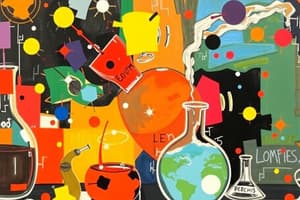Podcast
Questions and Answers
All substances are made of atoms, which are the smallest particles of matter.
All substances are made of atoms, which are the smallest particles of matter.
True (A)
Atoms cannot be divided into smaller particles according to Dalton's theory.
Atoms cannot be divided into smaller particles according to Dalton's theory.
True (A)
Atoms of different elements are identical in mass and properties.
Atoms of different elements are identical in mass and properties.
False (B)
Dalton's Billiard Ball Model was proposed in 1903.
Dalton's Billiard Ball Model was proposed in 1903.
Each element is composed of a unique type of atom with specific characteristics.
Each element is composed of a unique type of atom with specific characteristics.
All atoms of a given element are different in mass and properties.
All atoms of a given element are different in mass and properties.
Dalton's theory laid the groundwork for our understanding of chemical reactions.
Dalton's theory laid the groundwork for our understanding of chemical reactions.
Atoms joining together form compounds, which consist of different types of atoms in varying proportions.
Atoms joining together form compounds, which consist of different types of atoms in varying proportions.
Flashcards are hidden until you start studying
Study Notes
Dalton’s Atomic Theory
- All substances consist of atoms, which are the fundamental building blocks of matter.
- Atoms are indivisible and cannot be created or destroyed.
- Atoms of the same element have identical mass, while atoms of different elements differ in mass.
- Atoms combine to form compounds, maintaining consistent types and proportions of atoms.
Dalton’s Billiard Ball Model
- Developed by John Dalton in 1803, forming the basis of modern atomic theory.
- Portrays atoms as small, solid, and indivisible spheres, similar to billiard balls.
- Each element contains a unique type of atom, each with distinct characteristics.
- Atoms of an element are identical in mass and properties but differ from those of other elements.
Studying That Suits You
Use AI to generate personalized quizzes and flashcards to suit your learning preferences.




